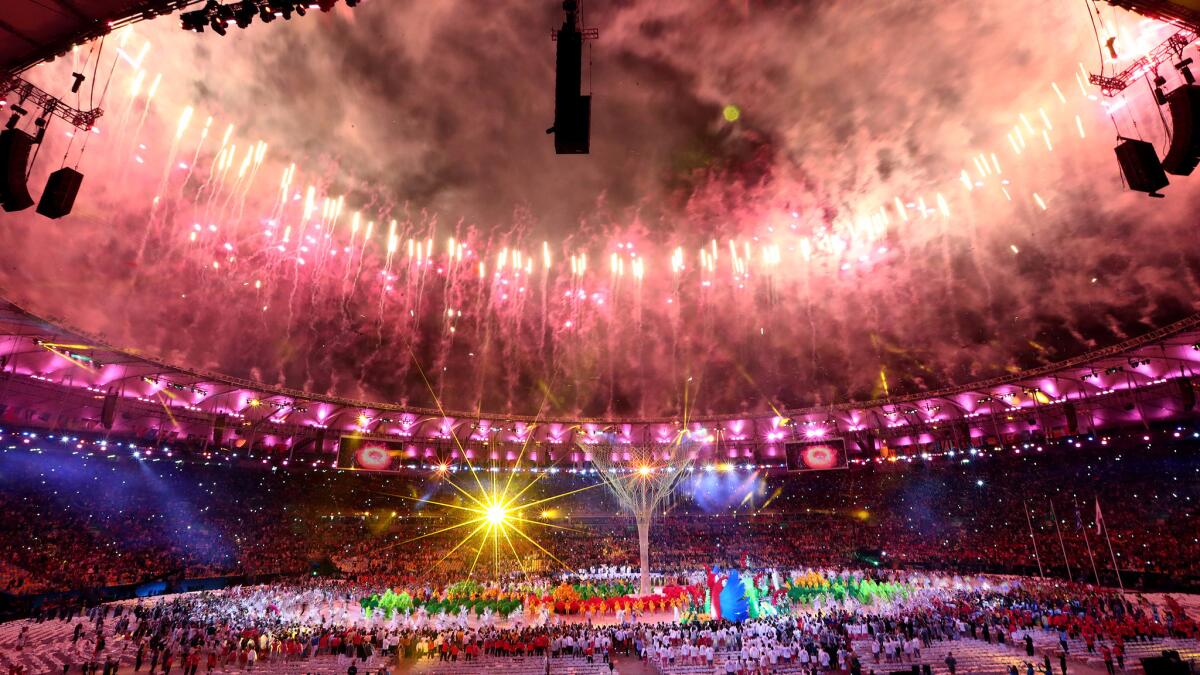Rio Games score smallest TV audience since 2004 as streaming hits record high

- Share via
Video streaming every competitive event at the Olympics may have been too much of a good thing for NBC.
The prime-time TV audience over 17 nights for the Rio Games averaged 25.4 million viewers, the lowest since the 2004 Games in Athens, which averaged 24.9 million viewers. Nielsen data showed an 18% decline from the 31.1 million who watched the 2012 Games in London.
But online streaming of live video on NBC’s apps reached 2.7 billion minutes, nearly double the amount for all previous Olympic Games. When online viewers of replays and highlights are added in, the total is 3.3 billion minutes. NBC said its digital coverage had 100 million unique users, a 29% increase over the 2012 Games.
When NBC executives return from Rio, their first job will likely be analyzing how much streaming cannibalized the traditional TV audience. Every event was available live online and a stream of the prime-time coverage was offered as well. Live Olympics coverage was also carried on NBCUniversal’s cable networks, in effect competing with the broadcast network coverage.
“We learned a lot about consumption habits and attracted new audiences,” NBC Sports Group Chairman Mark Lazarus said in a statement. “We’ll use all of the data from all of our platforms to develop our plans for Pyeongchang in 2018 and Tokyo in 2020.”
NBC has the rights to the Olympics through 2032 across all TV and digital viewing platforms.
NBC executives expected the Rio Games to show a ratings improvement in over London, as more live competition could be shown from the time zone-friendly venue.
But viewers’ comfort level with watching the Games on digital devices is clearly growing at a faster pace than anticipated and likely into TV viewing, especially among 18- to 34-year-olds. Competition results are also much harder to avoid in the age of social media and text alerts, making spoilers prevalent for events shown on a delay.
Nonetheless, Lazarus declared the event a success for NBC, as the ratings for the Games were still massively higher than the broadcast competition and boosted the numbers for other programs on the network.
The average prime-time household rating was lower than what NBC guaranteed advertisers, but Lazarus said early on that all audience delivery promises would be met. Sponsors likely received some of the unsold commercial time the network had left in the Games to make up for the ratings shortfall.
For the ninth straight Olympics, the Rio Games were most popular with TV viewers in Salt Lake City, where they averaged a 20.4 rating, according to Nielsen data. A rating point is equal to a percentage of TV households.
In Los Angeles, the Games averaged a 15.8 rating, ranking 23rd out of Nielsen’s 64 TV markets. In New York, the average was a 15.3, which tied for 28th place. Chicago ranked 21st, as the Games averaged a 15.8 rating in the market.
Twitter: @SteveBattaglio
Olympic ratings fall short of expectations for NBC’s TV advertisers
The Redstones’ war with Viacom ends: Philippe Dauman resigns, Tom Dooley elected new CEO
Settlement to end Viacom war would have CEO Philippe Dauman replaced by Tom Dooley
More to Read
From the Oscars to the Emmys.
Get the Envelope newsletter for exclusive awards season coverage, behind-the-scenes stories from the Envelope podcast and columnist Glenn Whipp’s must-read analysis.
You may occasionally receive promotional content from the Los Angeles Times.








